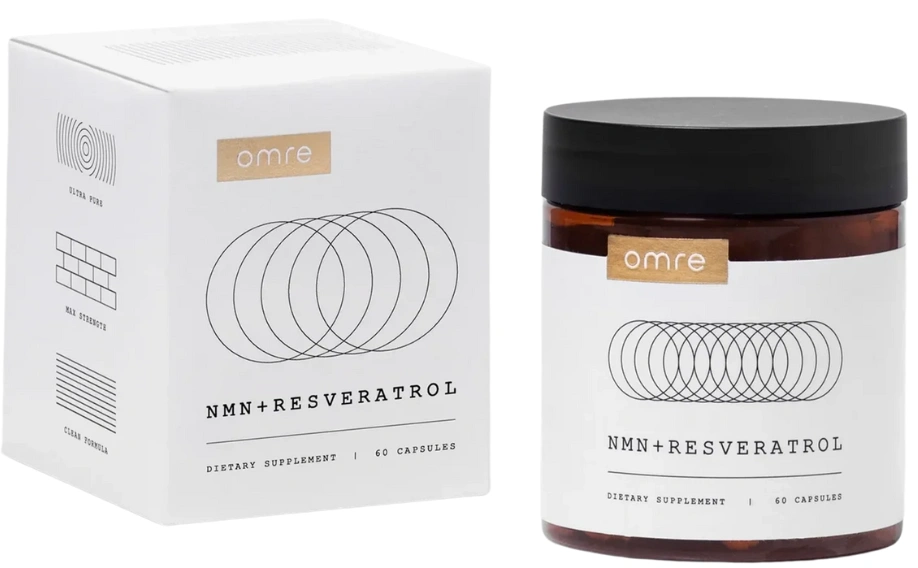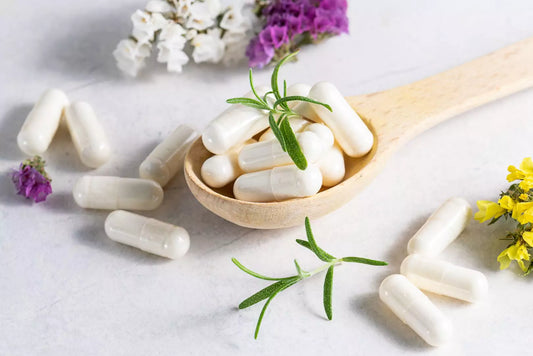Table of Contents
- Key Takeaways
- What Are Nicotinamide Mononucleotide Supplements?
- How Does Nicotinamide Mononucleotide (NMN) Work in the Body?
- Potential Health Benefits of NMN Supplements
- Are NMN Supplements Safe?
- NMN vs NR vs Niacin
- Who Should Consider Taking NMN Supplements?
- How to Choose a High-Quality NMN Supplement?
- What Does the Research Say About NMN?
- How to Increase Your Body’s NAD+ Levels Naturally
- Conclusion
- FAQs
A nicotinamide mononucleotide supplement (NMN) helps your body make NAD+, a molecule that supports energy, cell repair, and healthy aging. As NAD+ levels drop with age, NMN may help restore them and improve how you feel and function.
Here’s what you need to know about how NMN works, its benefits, how to take it safely, and how to choose a quality product.
Cellular NAD+ booster with ultra‑pure NMN and Resveratrol, at research‑backed doses.*NMN + RESVERATROL
Key Takeaways
NMN supplements support energy, metabolism, and healthy aging by raising NAD+ levels.
Research shows that NMN may help improve muscle function, insulin sensitivity, and cellular repair.
It's generally safe at doses up to 1,200 mg per day, with minimal side effects reported.
For best results, choose a pure, third-party tested NMN supplement from a trusted brand.
What Are Nicotinamide Mononucleotide Supplements?
-v1750546519971.webp) Nicotinamide mononucleotide (NMN) supplements are a popular way to support cellular energy and health by increasing NAD levels. NMN is naturally found in the body and in small amounts in certain foods.
Nicotinamide mononucleotide (NMN) supplements are a popular way to support cellular energy and health by increasing NAD levels. NMN is naturally found in the body and in small amounts in certain foods.
Still, supplements provide a higher concentration that may help counteract age-related declines in energy and metabolism.
In the body, NMN serves as a type of fuel, working to produce NAD (nicotinamide adenine dinucleotide), which is essential for various cellular functions. NAD is critical in metabolism, DNA repair, and stress resistance.
As our NAD levels naturally decline with age, researchers have investigated NMN’s potential to help restore these levels.
A study published in Cell Metabolism found that boosting NAD through NMN supplements could improve metabolic health and insulin sensitivity in aging animals, sparking interest in its potential for humans (1).
Research in humans has also shown promising results for NMN in supporting healthy aging. For instance, a study demonstrated that NMN supplementation improved energy levels, muscle strength, and endurance in amateur runners (2).
Although more human studies are needed, these findings suggest that NMN supplements might support healthy aging by increasing NAD levels.
How Does Nicotinamide Mononucleotide (NMN) Work in the Body?
NMN works in the body by converting into NAD, a molecule that supports energy production and cellular repair. Essentially, NMN acts as a precursor to NAD, helping the body generate the energy it needs to carry out vital processes.
Once NMN enters your cells, it transforms into NAD, which activates various proteins responsible for cellular repair and stress resistance. One of the key pathways involves a protein called sirtuin, which is known to play a role in longevity.
According to a study, increasing NAD levels can enhance the activity of sirtuins, supporting DNA repair and overall cellular health. This process may help protect against age-related decline by keeping cells functioning at their best (3).
In addition to supporting longevity, NAD helps regulate metabolism by working alongside mitochondria, the powerhouses of cells, to convert food into energy.
Studies, such as the one by Cell Metabolism, have shown that higher NAD levels may improve insulin sensitivity and help maintain metabolic balance, which often becomes disrupted with age (4).
Potential Health Benefits of NMN Supplements
 NMN supplements are being studied for their potential to support several aspects of health, especially as we age. Boosting NMN levels can help maintain the functions our cells rely on to stay healthy and active.
NMN supplements are being studied for their potential to support several aspects of health, especially as we age. Boosting NMN levels can help maintain the functions our cells rely on to stay healthy and active.
Energy Metabolism
One of NMN's key benefits is its role in supporting energy metabolism. As NMN helps produce NAD, which is needed for the mitochondria (the cell's energy factories) to function, it may assist with maintaining energy levels.
An animal study found that supplementing with NMN helped restore NAD levels, which could support better energy production in older mice (5). This suggests that NMN might have a similar role in humans by helping maintain energy as we age.
DNA Repair and Cellular Health
NAD, produced from NMN, is vital for DNA repair and maintaining cell health. Without adequate NAD, the body’s ability to fix damaged DNA slows down, which is linked to aging and disease.
Animal studies have shown that NAD supports the activation of sirtuins, proteins that help repair DNA and maintain cellular health. By keeping NAD levels up, NMN may support the body’s ability to repair and maintain itself (6).
Heart Health
Research suggests that NMN may have protective effects on heart health. Animal studies have shown that increasing NAD through NMN can help reduce signs of aging-related heart damage.
For instance, a study published in Nature Communications found that NMN helped preserve heart function in older mice, which offers hope for similar benefits in humans (7).
Brain Health
NMN might also support brain health. Animal research has shown promising results in cognitive health with increased NAD levels from NMN supplementation.
NMN was shown to improve brain function in older mice, suggesting that it may help protect the brain against age-related cognitive decline. Although, it’s important to note this has not been studied in humans yet (8).
NMN + RESVERATROL
Cellular NAD+ booster with ultra‑pure NMN and Resveratrol, at research‑backed doses.*
Are NMN Supplements Safe?
NMN supplements appear to be safe for most people when taken at appropriate doses. Animal and human research has shown minimal side effects, and people generally tolerate it well.
Studies found that daily doses of NMN up to 1,200 mg were well tolerated without significant adverse effects (9).
However, as with any supplement, it's always a good idea to check with your doctor before starting, especially if you have underlying health conditions.
While there is still more to learn, current evidence suggests that NMN supplements are generally safe for healthy individuals. As more human studies are conducted, we’ll have a clearer picture of their long-term safety.
NMN vs NR vs Niacin
If you're trying to choose between NMN, NR, and Niacin for raising NAD+ levels, here’s how they stack up in terms of effectiveness, safety, and purpose.
Who Should Consider Taking NMN Supplements?
NMN supplements may be worth considering for those looking to support their health as they age, especially individuals interested in cellular energy, heart health, or managing fatigue.
As NMN helps produce NAD, which is essential for energy metabolism and DNA repair, it has attracted attention from people looking to maintain vitality.
However, since research is still developing, it’s best to consult a healthcare professional before adding NMN to your routine.
How to Choose a High-Quality NMN Supplement?
When selecting the best NMN supplement, there are a few key factors to look for to make sure you’re getting a high-quality product that meets your needs.
Purity
Purity is crucial in supplements, and with NMN, a high-purity product will ensure you’re getting the intended dose without unnecessary fillers or contaminants.
Look for companies that test and certify their NMN for purity. Many reputable brands provide lab results showing the percentage of NMN in their product to reassure buyers of their quality.
Dosage
NMN dosages vary, with some studies showing benefits at doses as low as 250 mg and others going up to 1,200 mg per day. Beginners may want to start with a lower dose, observing any effects before gradually increasing.
Experts consider a dose of 500-600mg as a sweet spot for optimal dosing. For example, a 2023 study in humans showed that NAD concentration and physical performance peaked at 600mg. (11)
Keep in mind that research on optimal dosages for long-term use in humans is still ongoing, so it’s best to follow recommended amounts from trusted sources or consult a healthcare provider.
Brand Reputation
Choose brands with a strong reputation in the supplement industry, as they are more likely to use high-quality ingredients and follow good manufacturing practices. Established brands often have more resources to invest in product testing, quality control, and customer support.
Reading reviews and looking for brands that disclose their sourcing and testing practices can also help ensure you’re buying from a reputable company.
Third-Party Testing
Third-party testing is an additional quality measure that offers transparency and confidence in a product. When a supplement is third-party tested, it is reviewed by an independent lab to confirm the purity and accuracy of the ingredients.
This step adds a layer of reliability, as independent labs provide unbiased verification of what is inside the product. Look for NMN supplements that are marked as third-party tested to have greater assurance about the product’s safety and composition.
What Does the Research Say About NMN?
Research on NMN supplements is growing, especially in the areas of aging, metabolism, and cellular health.
Animal studies have shown promising results for NMN in enhancing NAD production, which is important for energy and DNA repair and potentially reducing some age-related effects (10).
For instance, Dr. David Sinclair from Harvard and other researchers have explored NMN’s role in supporting longevity, suggesting that NMN supplements could potentially support healthier aging by improving cellular functions (11).
Human studies are still limited, but preliminary findings hint at benefits like improved insulin sensitivity and reduced fatigue in middle-aged groups.
How to Increase Your Body’s NAD+ Levels Naturally
Looking to boost your NAD+ levels naturally? Here are a few simple ways to support your body without supplements:
Include NAD-supportive foods in your diet, such as avocados, broccoli, and tomatoes.
Exercise regularly to naturally stimulate NAD+ production.
Maintain a balanced diet for long-term cellular health.
Conclusion
NMN supplements present an exciting area of study in the field of aging and longevity. Research highlights potential benefits for energy, heart and brain health, and cellular repair.
As NAD+ levels naturally decline with age, NMN supplementation could help maintain cellular function.
That said, human studies are still emerging, and anyone considering NMN supplements should consult a healthcare provider to discuss their unique health situation.
Curious about trying NMN for yourself? Omre’s NMN + Resveratrol supplement combines ultra-pure NMN and Resveratrol in research-backed doses to boost NAD+ levels and support healthy aging.
Designed to enhance cellular energy and promote longevity, it’s a great option for those looking to combat age-related declines naturally. Ready to take the next step? Check availability and see how this powerful formula can support your health goals.
Ready to take the next step? Check availability and see how this powerful formula can support your health goals.
FAQs
Can NMN supplements reverse aging?
NMN supplements may help support cellular health and reduce some signs of aging, but no single agent can completely reverse aging. There are several hallmarks of aging, and it is impossible for a single ingredient to reverse aging. That said, NMN can boost NAD levels, thus targeting one of the hallmarks of aging: declining NAD.
How long does it take to see results from NMN supplementation?
Studies show that NMN can boost blood NAD levels in at little as 2 weeks. How long it takes to translate to measurable and observable benefits is naturally much longer. Some users report feeling more energetic within weeks, but results can vary depending on dosage and individual health factors.
In general, it is best to perform biological age testing before starting NMN and then repeat the test after at least 6 months of taking NMN.
Are there natural food sources of NMN?
Yes, NMN is found in foods like avocados, broccoli, cabbage, tomatoes, and edamame, though in very small amounts. For example, to get the same amount of NMN as you would from a 500mg supplement, you’d need to consume 50 pounds of broccoli!
Can NMN supplements be taken with other vitamins?
Yes, NMN can generally be taken with other vitamins, but it’s always wise to consult with a healthcare provider first. Because NMN is a derivative of vitamin B3, it’s best not to take NMN with a supplement containing vitamin B3 (Niacin/niacinamide)
Is NMN the same as niacin or nicotinamide?
No, NMN is different. To clarify, NMN is made by combining Vitamin B3 with sugar and phosphate. While this seems like a couple of small steps, in biological terms, it makes the compound very different from vitamin B3 alone. While related, NMN is significantly different from vitamin B3.
Should I cycle NMN?
There’s no strong evidence that cycling NMN is necessary. However, some users choose to take short breaks (e.g., 1–2 days per week or 1 week off every few months) to mimic natural rhythms. If you're unsure, talk to your healthcare provider.
Is sublingual NMN better?
Sublingual NMN may offer faster absorption by bypassing the digestive system, but both sublingual and oral forms have shown the ability to raise NAD+ levels. The best choice depends on personal preference and product quality.
How does NMN compare to NAD IV therapy?
NMN supplements are more affordable, convenient, and better studied in humans. NAD IV therapy may deliver NAD directly, but research suggests the molecule is too large for efficient absorption through the bloodstream. NMN is often considered a more practical option.





